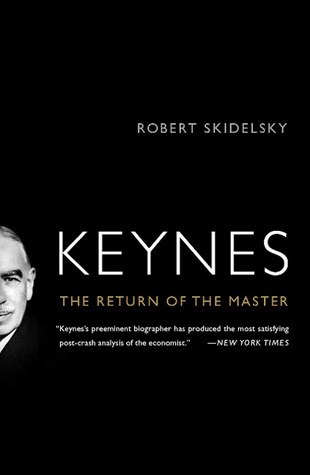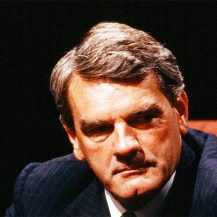On Robert Skidelsky's 'Keynes: The Return of the Master'
Skidelsky offers an accessible introduction to the work of John Maynard Keynes
This text originally published: 9 February 2010

Robert Skidelsky's Keynes: The Return of the Master (Public Affairs, 2009) is a short and accessible introduction to the economic and philosophical worldview of John Maynard Keynes, the 20th Century British economist whose ideas are suddenly back in vogue as governments seek to mop up the mess caused by overleveraged banks, easy credit, and speculators who didn't understand their own investment vehicles. Skidelsky also authored a three-part biography of Keynes, and he uses his familiarity with the man to detail the development of his ideas.
One of Skidelsky's main themes is Keynes' distinction between risk and uncertainty, a distinction lost on the neoclassical (neoliberal/freshwater/Chicago) economics that has guided economic policy since the late 1970s. For Keynes, uncertainty about the future is key to economic decision making; people have little capacity to accurately predict the future, and they make decisions based on conventional expectations ("rules of thumb") about probable future expectations rather than relying on the perfect knowledge assumed to be available to them by the neoliberal camp.
Risk, on the other hand, is reserved for economic activities where, in Keynes' words, "our views of the future are... reliable in all respects". In other words, investors invest in situations where they are relatively well apprised of the risk, and confident about the returns. There is a risk that the confidence is misplaced, but not necessarily one so strong that the desire to invest is extinguished. Uncertainty is different from risk, in that we cannot confidently assess the future, leaving us, says Keynes, in a position where "our previous expectations are liable to disappointment and expectations concerning the future affect what we do today."
Skidelsky argues that the trouble with current economics is that Keynes' distinction has been rubbed out of our thinking by the neoliberal approach, with its heavy reliance on mathematical models, "risk management" strategies, and unreal assumptions of "rational expectations" and perfect information about future events. The econometric premise that past or present performance is a reliable indicator of future results—the basis of the risk management strategies that have so spectacularly failed in the ongoing crisis—is one that Keynes thoroughly rejected, in part by noting the power of human innovation to induce pattern-smashing paradigmatic shifts.
Skidelsky notes that Keynes held that people were reasonable, but not always "rational" in the sense of the word used by neoclassical economists. This is evidenced by their reliance on rules of thumb and conventions in the formation of expectations. It also helps explain their "liquidity preference" (the desire to keep their assets in more easily tradeable forms, with money/cash being the most liquid) in times of increased uncertainty, despite the negative impact such saving—in aggregate—can have on the economy.
Keynes recognized that the combined effect of individuals' liquidity preference in uncertain times would lead to higher interest rates (since people threatened by uncertainty were less willing to part with their cash, driving its price up) in the precise moments when lower interest rates should prevail (thereby spurring investment that could restart a stalling economy). Keynes famously held that governments should—in these uncertain periods—fill the void left by lack of private investors, using the public purse to drive an economy through the moments of highest uncertainty, sustaining the recovery by spending. In less uncertain times, when investors had more confident expectations and people were willing to spend money more freely, government economic policy could revert to reducing income inequality and promoting leisure.
Yes, leisure. Another interesting aspect of Skidelsky's book is his exploration of Keynes' commitment to an ethical economics aimed at diminishing "love of money" and instead promoting a morally grounded "good life" in which we would live "wisely, agreeably, and well". As Skidelsky summarizes, one of the key values of Keynes' economics is that it
keeps alive the importance of having an idea of the good life. Without it, economic activity is bound to be simply an envious striving for relative advantage, without any natural terminus... Keynes forces us to consider the question of what economic activity is for.
At 193 pages, the book is quite short, and those looking for detailed theoretical arguments will probably be somewhat let down. Instead, this is a book ideally suited to university courses and interested "lay" readers looking to get a better understanding of the background for such current trends as "fiscal stimulus", "quantitative easing", and "economic recovery". Standout sections include Chapter Two, "The Present State of Economics", which examines the tenets of the neoliberal school and some critiques thereof; Chapter Four, "Keynes's Economics", which is a useful introduction to the vast topic; and Chapter Six, "Keynes and the Ethics of Capitalism", which outlines the more holistic breed of economics that Keynes sought to establish. The closing chapter, "Keynes for Today", contains policy prescriptions based on Skidelsky's channeling of Keynes into the present day—including a call to broaden the scope of studies of economics students and rescue the discipline from its current emphasis on purely mathematical pursuits. Regarding the meta topic of today's financial crisis, Skidelsky suggests that "We need a new synthesis, in which government is accepted as non-benevolent, but market forces are not thereby totally rehabilitated."
Skidelsky's Keynes: The Return of the Master implicitly serves as a reminder that economic policy is often reexamined in the depths of crisis, when minds are muddled by the urgency of the situation. By invoking the ideas of Keynes, who worked during the last great depression and whose policies helped drive the recovery from it, Skidelsky provides a timely corrective to some of the theoretical miscues and moral shortcomings that led to our current morass.
Keynes: The Return of the Master
Robert Skidelsky
Public Affairs, 2009


